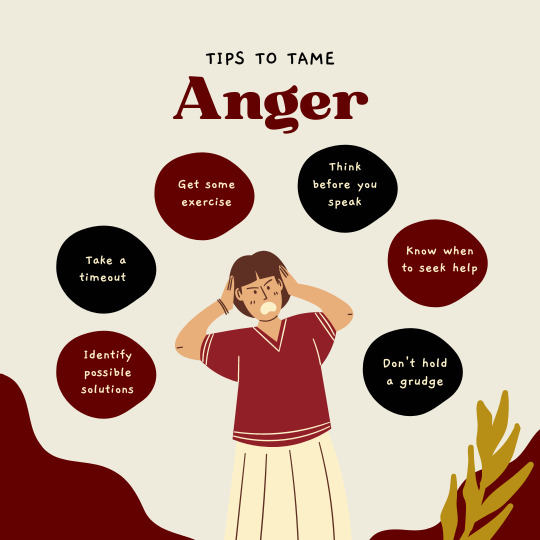#Anger Management tips
Explore tagged Tumblr posts
Text
These are good tips.
what are you even supposed to do when youre angry. cant scream at anyone cos im not a dick. cant break anything cos i paid money for that. cant rip my hair out cos i need it on my head. literally what now
164K notes
·
View notes
Text
youtube
Anger is a natural human emotion, but when it spirals out of control, it can have destructive effects on our relationships, mental health, and overall quality of life. Learning how to overcome anger is not about suppressing your feelings; it’s about understanding them, responding constructively, and channeling your emotions in healthier ways. This guide provides actionable steps, backed by psychological research and mindfulness practices, to help you take control of your anger and transform it into positive energy.
#how to overcome anger#motivational video#self improvement#how to overcome fear#how to control your anger#inspirational story#mental health#overcome anger#how to deal with anger#anger management tips#how to overcome fear and anxiety#how to avoid anger#anger issues#inspirational video#motivational speech#Youtube
0 notes
Text
#anger#anger management#how to control anger#anger management techniques#anger issues#dealing with anger#controlling anger#ways to control anger#anger management tips#anger management issues#help for anger issues#how to deal with anger issues#how to control anger immediately
1 note
·
View note
Text
Navigating Anger: A Guide to Understanding and Managing Your Emotions
Shaina Tranquilino February 26, 2024

Anger is a powerful and natural emotion that everyone experiences at some point in their lives. While it's completely normal to feel angry, it's essential to learn how to navigate and manage this emotion constructively. Uncontrolled anger can lead to negative consequences in personal relationships, professional settings, and even physical health. In this blog post, we will explore the roots of anger, its effects on the body and mind, and practical strategies for managing and redirecting this intense emotion.
Understanding the Roots of Anger:
Identify Triggers: The first step in managing anger is to identify its triggers. Understanding what situations, events, or behaviours provoke your anger allows you to take proactive steps in addressing the underlying issues.
Explore Underlying Emotions: Anger is often a secondary emotion that masks underlying feelings such as fear, frustration, or sadness. Take the time to explore these primary emotions to gain a deeper understanding of what is truly bothering you.
Effects of Anger on the Body and Mind:
Physical Consequences: Chronic anger can have detrimental effects on physical health, including increased blood pressure, heart problems, and a weakened immune system. Recognizing these health risks can serve as motivation to address and manage anger more effectively.
Mental Health Impact: Anger can also take a toll on mental well-being, contributing to stress, anxiety, and even depression. Learning to cope with anger positively is crucial for maintaining good mental health.
Practical Strategies for Managing Anger:
Practice Deep Breathing: When anger surfaces, take slow, deep breaths to calm the nervous system. Deep breathing can help regulate emotions and create a sense of control in the midst of intense feelings.
Communication Skills: Expressing anger in a healthy way involves effective communication. Use "I" statements to express your feelings without blaming others, and actively listen to the perspectives of those involved.
Take a Timeout: If you feel overwhelmed by anger, it's okay to step away from the situation. A timeout allows you to cool down and approach the issue with a clearer mind.
Physical Activity: Channeling anger into physical activity, such as going for a run or hitting the gym, can be an effective way to release pent-up energy and tension.
Seek Professional Help: If anger issues persist and negatively impact your life, seeking the help of a mental health professional can provide valuable tools and insights to manage and understand your emotions.
Anger is a complex emotion, and learning how to navigate it is an ongoing process. By understanding the roots of anger, recognizing its effects on the body and mind, and employing practical strategies for management, individuals can develop healthier ways to cope with this powerful emotion. Taking proactive steps to address anger not only benefits personal well-being but also contributes to stronger, more positive relationships and a more fulfilling life overall.
#anger#navigating anger#emotional wellness#anger management tips#mindfulness in anger#healthy expressions#emotional intelligence#calm within the storm#self reflection#positive outlets#it is okay to get angry once and a while#inner peace journey
1 note
·
View note
Video
youtube
Ready to conquer your anger? Discover juicy tips, mind-blowing techniques, and insane hacks to transform your anger into your superpower. Don't let anger control your life—learn to drive it with us! For more click here
#youtube#anger management#emotions#mental health#anger management tips#grounding techniques#self improvement#positive mindset#emotional wellness#stress management#mindful living#emotional responsibility#mental health tips#drive your anger#anger#dont let it drive you#anger management clip#emotional control#self-empowerment#mindfulness#emotional intelligence#coping strategies#personal growth#mastering emotional responsibility#how to master anger management#mindscope
0 notes
Text
Prompt:
Dick wants to be a better brother for Tim than he was for Jason, so he turns to an online forum to get tips on how to bond with younger siblings ((and maybe try to cope with the trauma of losing Jason in a way that isn’t running headlong into danger)).
Unbeknownst to him, his chat buddy is a bored Jason sitting ducks on the other side of the world, waiting for Talia to find him a new trainer.
Neither of them expect how much this ends up changing things.
#Dick on the online forum: looking for younger sibling to tell me how to bond with them in a way that won’t result in screaming matches#Jason: I might have some tips for you#both their usernames are so painfully obvious that neither clocks it for what it really is#Dick helping Jason with anger management#Jason helping Dick to communicate with Tim#by accident#identity shenanigans#jason todd#dick grayson#batfamily#bruce wayne#batfam#robin#tim drake#red hood#prompts
1K notes
·
View notes
Text
Epic gamer tip:
If you want to take out your anger on something, use a cardboard box!
Empty packaging? Get crushed.
Empty boxes for Lego sets? More crumpled than my grandmother after she fell down the stairs. (I miss you gram-gram)
Funko pop boxes? I mean, go ahead but I wouldn't.
McDonald's cups also work well!
#this may be a bad tip for#anger management#but like#it helps me#so maybe it can help you#who knows#kay's horrible life tips
12 notes
·
View notes
Text
PSA on deescalation
Listen to the person! Yes, when people are angry they don't always communicate clearly and sometimes say things that they don't mean. But they are still intelligent human beings capable of knowing how they feel.
Leave the situation! If it's safe, leave the situation! It takes two to tango and it's harder to fight when you don't have an enemy anymore. If the person is telling you to leave you probably should.
Also you should almost never trap or prevent the other person from leaving! Letting someone who is upset leave allows them to get some space alone, get space from the conflict, feel safer, and get some adrenaline out by moving. You may feel it's not safe to leave the person or let the person leave. But try to balance those concerns with the fact that it's not fair to hold them hostage in a situation they don't feel safe in, at that point you're antagonizing them. Also you should respect that person's autonomy and judgement, they know themselves better than you do and often they want to avoid the conflict escalating as well.
Validate the other persons emotions! This helps show concern and make someone feel heard, which helps stem the conflict and stress. You don't have to apologize or deny what they did is wrong but express understanding and compassion for the distress they are feeling.
Express concern not judgement! If you think they "need help" ask if they "are okay?" ask if they need help. But don't tell them to "calm down."
Communicate your concerns! If you're concerned that safety of the the other person or other people if you leave the situation let them know. You might be able to work out a deal so that they walk a certain way so that you can see them get away safe. You can give them resources. This also communicates concern.



This all comes from what I've learned studying psychology and education. As well as from working in schools and mental hospitals. I don't have time right now to include references but if you curious about things mentioned I encourage you to look up deescalation techniques as well as the individual techniques I've mentioned.
#tips#safety#safety tips#emotion regulation#emotional regulation#stress management#parenting#conflictresolution#conflict resolution#frozen#fixer upper#anger management#anger issues#psa#deescalation#mental health#ableism#road rage#post#important#psychology#counseling#therapy
45 notes
·
View notes
Text
Navigating the Silence: When Your Voice Feels Lost and Your Worth Overlooked
Ever felt like you're shouting into the void, only to be met with indifference or dismissal? You're not alone. The struggle to be heard and respected is woven deeply into the human experience. Whether in relationships, the workplace, or personal reflection, this yearning for validation is universal. When unmet, it can stir emotional turmoil and erode our sense of self-worth.
This exploration aims to offer clarity, support, and actionable strategies to help you cope with these emotions and foster more meaningful connections. The truth is, feeling unheard and disrespected is a shared experience, but with intention and the right tools, positive change is within reach.
The Weight of Being Unheard
At its core, feeling unheard is the painful sense that your thoughts and emotions are overlooked or misunderstood. It’s that invisible barrier that isolates you, even when surrounded by others. This emotional disconnection can range from mild frustration to profound loneliness, often chipping away at self-esteem and trust in others. Over time, these experiences can leave you questioning your own worth.
The Sting of Disrespect
Disrespect, on the other hand, strikes at your inherent dignity. It can be blatant, like an insult, or subtle, like being repeatedly interrupted or dismissed. What defines disrespect varies from person to person, shaped by personal values and cultural backgrounds. Yet, the emotional toll—anger, hurt, shame, or even fear—is universal.
Where the Two Intersect
Often, feeling unheard and disrespected go hand in hand. When your voice is ignored, it’s easy to feel devalued. This dynamic can stem from mismatched communication styles, unmet emotional needs, or power imbalances in relationships. In the workplace, it might manifest as being overlooked for your contributions or having your ideas dismissed.
The Internal Struggle
Sometimes, these feelings are rooted in internal factors. A passive communication style, self-doubt from past experiences, or difficulty expressing emotions can all contribute. These patterns can lead to a cycle of emotional distress and reinforce the belief that your voice doesn’t matter.
The Ripple Effect
In the short term, frustration, anger, and sadness are natural responses. Over time, these emotions can morph into anxiety, self-doubt, and social withdrawal. The chronic stress of feeling unheard and disrespected can even affect physical health and lead to unhealthy coping mechanisms.
Reclaiming Your Voice
Self-Reflection: Identify what being heard means to you. Is it validation, empathy, or uninterrupted listening?
Assertive Communication: Use "I" statements, like "I feel unheard when..." to express your needs without blame.
Active Listening: Show genuine interest in others' perspectives and mirror their words to ensure understanding.
Setting Boundaries: Clearly define what behavior is acceptable and follow through with consequences when boundaries are crossed.
Building Self-Worth: Practice self-compassion, challenge negative self-talk, and celebrate your achievements.
Mindfulness and Emotional Regulation: Use grounding techniques and mindful breathing to manage emotional overwhelm.
Seeking Professional Support: Therapy can help unpack past experiences, develop healthier communication patterns, and build resilience.
The Path Forward
Healing takes time, but every step toward self-awareness and assertiveness strengthens your ability to connect with others and protect your emotional well-being. You deserve to be heard and respected. By prioritizing your voice and valuing your own experience, you can create spaces where your truth resonates—and your presence is truly seen.
#coping with feeling unheard#dealing with disrespect#emotional validation strategies#building self-worth#assertive communication tips#overcoming loneliness#improving relationship dynamics#setting healthy boundaries#active listening techniques#mindfulness for emotional regulation#self-compassion practices#therapy for self-esteem#handling workplace disrespect#emotional resilience tips#understanding communication styles#navigating emotional isolation#managing frustration and anger#boosting self-confidence#improving mental well-being#finding your voice#addressing unmet emotional needs#building trust in relationships#stress management strategies#healing from past trauma#avoiding toxic relationships#recognizing emotional neglect#personal growth techniques#self-reflection for emotional clarity#enhancing communication skills#creating meaningful connections
2 notes
·
View notes
Text
another aspect of this is that when i get really extremely mad during this type of shit i do genuinely beat the shit out of myself. and, well, this is something i haven't ever told anyone, but i'm pretty sure that the long period of daily migraines i got may or may not have been caused by playing Guilty Gear X (Play Guilty Gear Strive today) and getting so worked up and angrily miserable trying to fight testament that i repeatedly hit my head with my fists until it hurt too much to continue a week or two before. hard to say! the CT scan showed basically nothing and the MRI situation never got resolved because when they realized i couldn't fit in the only one in the city that wasn't in a hospital, they shrugged their shoulders and said to hope it would get better. it did. i'll never know now i guess. literally harmful behavior i've never found a way to unlearn.
#again do not suggest things to me. i have tried the anger management tips. it doesn't feel like anger. it feels like compulsion.#it feels like being told i'm going to be hanged at midnight if i cannot learn how to play beethoven in 3 hours.
1 note
·
View note
Text
when I'm angry at someone I ask them if they're angry at me. something everyone should try.
0 notes
Text
Sitting With Anger: Transforming Fire Into Stillness
Anger Management Anger can arrive unannounced—a sudden spark ignited by frustration, misunderstanding, or pain. It grips the chest, heats the face, and clenches the fists. In its wake, it demands a reaction, but what if we met it with stillness instead? Sitting down—both physically and metaphorically—may be the simplest yet most profound way to engage with this powerful emotion. To sit is to…

View On WordPress
#anger management#artistic meditation#body scan meditation#calming anger#deep breathing exercises#emotional health#emotional transformation#meditation for beginners#meditation tips#mindful reflection#mindfulness techniques#Personal growth#self-awareness#visualization for calm
0 notes
Text
Navigating Emotional Changes in 7-Year-Olds
Over the last few months, we’ve noticed some big changes in Eloise’s behaviour. She’s seven now, and while we knew this age would bring new emotions and challenges, her sudden bursts of annoyance, moments of anger, raised voice, and even the occasional throwing or punching have taken us by surprise. If you’re seeing similar behaviour with your child, know that it’s all part of their growth.…
#7-12 year old development#child behaviour changes#child behaviour support#child emotional development#family mental health tips#family wellness tips#helping kids cope#kids mental growth stages#managing child anger#mental health in children#parenting advice#parenting through puberty#parenting young children#positive parenting strategies#supporting emotional growth in kids#supporting kids with anger#understanding child psychology
0 notes
Text
Mastering African Grey Parrot Anger: Essential Tips for Understanding and Managing Your Feathered Friend's Behavior!
Learn how to recognize and manage African Grey Parrot anger with practical tips for caring for your feathered friend, ensuring a happy and healthy bond with your parrot.
#african grey parrot care#africangrey#african grey parrot lifespan in captivity#tiktokparrot#african grey behavior#cute birds#african grey lifespan#african grey parrot#buying an african grey parrot#african grey#african gray parrot temperature#African Grey anger#african grey life#African Grey Parrot#African Grey Parrot Advice#african grey parrot anger#African Grey parrot anger behavior modification#African Grey parrot anger causes#African Grey parrot anger coping mechanisms#African Grey parrot anger desensitization#African Grey parrot anger management#African Grey parrot anger positive reinforcement#African Grey parrot anger prevention#African Grey parrot anger signs#African Grey parrot anger solutions#African Grey parrot anger therapy#African Grey parrot anger treatment#African Grey parrot anger triggers#african grey parrot behavior#African Grey Parrot care tips
0 notes
Text
How to Control Anger in a Relationship
Anger is a natural emotion that everyone experiences from time to time. However, when it comes to relationships, managing anger is crucial to maintaining a healthy and loving connection. Uncontrolled anger can lead to arguments, resentment, and even the breakdown of a relationship. Here are some effective strategies to help you how to control anger in a relationship.
1. Recognize Your Triggers
Understanding what specifically makes you angry is the first step in managing your emotions. Whether it's certain behaviors, words, or situations, being aware of your triggers allows you to prepare for and potentially avoid anger-inducing scenarios. Keep a journal or make mental notes about what sets off your anger to help you understand your emotional responses better.
2. Communicate Effectively
Good communication is the cornerstone of any healthy relationship. When you're feeling angry, it's important to express your feelings in a constructive manner. Use "I" statements to explain how you feel without blaming your partner. For example, say "I feel hurt when this happens" instead of "You always make me angry." This reduces defensiveness and promotes understanding.
3. Take a Time-Out
When you feel your anger rising, it's okay to take a break. Stepping away from the situation can give you time to cool down and think more clearly. Use this time to engage in activities that help you relax, such as deep breathing, meditation, or a walk. Once you're calm, you can return to the conversation with a clearer mind and a more rational perspective.
4. Practice Empathy
Empathy involves understanding and sharing the feelings of another person. When you practice empathy, you are more likely to respond with compassion rather than anger. Try to see the situation from your partner's perspective and acknowledge their feelings. This can help de-escalate tension and foster a more supportive environment.
5. Develop Healthy Coping Mechanisms
Instead of letting anger take control, find healthy ways to cope with your emotions. Physical exercise, journaling, or talking to a friend can be effective outlets for your feelings. By channeling your anger into positive activities, you can prevent it from harming your relationship.
6. Seek Professional Help
If you find it difficult to control your anger on your own, consider seeking help from a therapist or counselor. A professional can provide you with tools and strategies to manage your anger more effectively. Couples therapy can also be beneficial if both partners are committed to improving their relationship.
7. Set Boundaries
Establishing clear boundaries can help prevent situations that lead to anger. Discuss and agree on what is acceptable and what is not in your relationship. Respecting each other's boundaries creates a safe space where both partners feel valued and understood.
8. Forgive and Let Go
Holding onto grudges and past hurts can fuel ongoing anger. Practice forgiveness and let go of negative feelings to move forward. This doesn't mean you have to forget, but it does mean releasing the hold that these emotions have on you.
Conclusion
Controlling anger in a relationship is essential for maintaining harmony and mutual respect. By recognizing your triggers, communicating effectively, taking time-outs, practicing empathy, developing healthy coping mechanisms, seeking professional help, setting boundaries, and learning to forgive, you can manage your anger and strengthen your bond with your partner. Remember, it's not about never feeling anger, but about how you handle it when it arises.
#how to control your anger#how to control anger and anxiety#Anger management in a relationship#Tips to manage anger in a relationship
0 notes
Text
.
#does anyone have anger management tips? i can't find any therapists nearby that can take me on short notice#im so chill i swear#but sometimes i bottle things without realizing it#and then suddenly the chill is gone#some asshole was blaring music outside and i almost punched a wall and screamed out the window#someone honked at me when i (obvs) couldn't turn at the light and i flipped them off#i always give them the sarcastic thumbs up#jfdkljfdl#my partner oversalted dinner and i just put down the plate and drank a bunch of water and went to bed for a while#they made me dinner?? no reason for me to react like that
0 notes